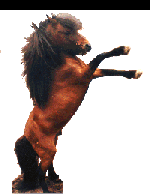|
|||
You horse will tell you when something is wrong. Any change in behavior is the first sign. The person that knows your horse best is the person who cleans the pens. That person is not asking the horse for anything. They are just being a horse. Ask your mucker to not any changes they may find. Pick your vet with care. I like the ones that do standard medicine and alternative. Horse respond extremely responsive to alternate methods. Vaccinate the horse for what is happening in your area. Your Vet will let you know what he is finding in the horse community and what you must protect your horse from. Worming should be done a minimum of twice a year, more often if your horse are leaving in a group environment. In the winter if you find a horse showing systems of being cold - he needs to be wormed. It is a good idea to change the type of wormer every time. Feet should be cleaned very time you work them. If you find thrush in the frog use a little Clorox to clean it up. Hoofs should be trimmed on a regular bases. Some horse grow faster than others so you can adjust time schedule as needed. Another thing to note, hoofs grow slower in the winter and faster in the summer. When you are caring for foals you MUST take care of their feet on a regular bases. If you let them go you could cause their legs to grow crooked. Colic is the number one medical cause of death in horses. Technically, colic refers to pain in a horse’s abdomen. In reality, colic is often a direct result of diet and is often preventable. (Check nutrition page.) Treating your horse as soon as you see the first system is the key. If you treat him and he does not have colic it won't hurt him at all so why not give it a try. Check your horses stool. If it is hard or dry he is not getting enought water. If it is too moist your horse has dirrera. This can kill a youg horse and is not good for the older horse either. To check horse for sand put on a plastic glove, pick up some poop that has not touched the dirt. Pull off the glove around the poop. Add water to the glove hang it in a tree. When you go back to look at the glove and there is a large about of sand you need to clean the sand out of your horse. Direrra can be cause by many different things. You may need to call the Vet. To stop the pain caused by the large amount of fluid in the intestion feed them "Sand Lack". It absorbs the moisture. You can also feed them some probiotic. When you are slecting a good probiotic don't settle for millions go for billions.
|
|||
 |
Dawg House Ranch |
